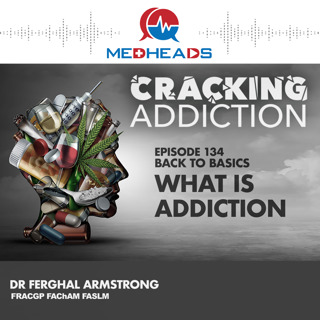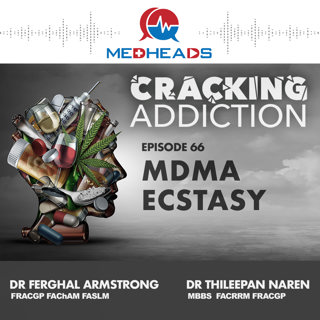
MDMA / Ecstasy
In episode 66 of Cracking Addiction we discuss MDMA or ecstacy and discuss its analogues PMA and PMMA and discuss the pharmacokinetics of these drugs, the unique properties of MDMA as both an atypical amphetamine-type substance and its effects as an empathogen. We also discuss the usage as both a recreational drug but also the new and emerging evidence of the clinical effects and benefits of MDMA and its increased usage in medical practice. MDMA has many effects on the body and we discuss the effects of MDMA on the brain, heart and liver in particular as well as some of the side effects of MDMA.Discussions and comments in our videos are for informational purposes only and should not replace the advice of your medical professional. Please consult with your doctor before making any changes to your medical treatment or lifestyle.Latest Blogshttps://www.meducate.com.au/blogAbout Meducate ®Meducate provides online education for doctors, clinicians, health professionals and the public.See the website to browse the many different talks and courses available https://www.meducate.com.au
16 Nov 202226min
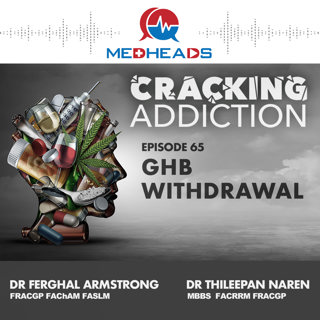
GHB Withdrawal
In this episode of Cracking Addiction we discuss the timeframe of GHB withdrawal, the severe and significant symptoms of GHB withdrawal and the potential life threatening sequelae of GHB withdrawal. We explore the approach to GHB withdrawal management including medications that can assist to manage these symptoms and the need to speak specialist help promptly given the potential for significant deterioration.Discussions and comments in our videos are for informational purposes only and should not replace the advice of your medical professional. Please consult with your doctor before making any changes to your medical treatment or lifestyle.Latest Blogshttps://www.meducate.com.au/blogAbout Meducate ®Meducate provides online education for doctors, clinicians, health professionals and the public.See the website to browse the many different talks and courses available https://www.meducate.com.au
9 Nov 202219min
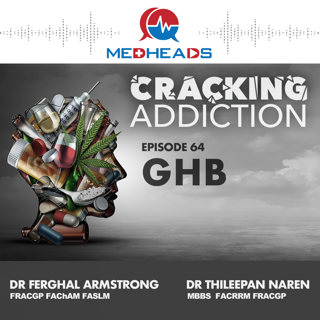
GHB
In this episode of Cracking Addiction we discuss GHB and its analogs GBL and 1,4-butanediol and the differences between these drugs. We explore the clinical indications for GHB as well as the pharmacology and pharmacokinetics of this drug. We discuss the side effects of GHB and some of the symptoms of GHB withdrawal.Discussions and comments in our videos are for informational purposes only and should not replace the advice of your medical professional. Please consult with your doctor before making any changes to your medical treatment or lifestyle.Latest Blogshttps://www.meducate.com.au/blogAbout Meducate ®Meducate provides online education for doctors, clinicians, health professionals and the public.See the website to browse the many different talks and courses available https://www.meducate.com.au
2 Nov 202215min

Higher and Friendly Powers
In this episode of Cracking Addiction we speak to Professor Peg O'Connor, a professor of moral philosophy who is in recovery from alcohol use disorder and who addresses an audience much like herself: those in recovery who have struggled with the Christian-centric God at the heart of Alcoholics Anonymous. She brings our attention to a little-known fact: the term “higher power,” a touchstone in the twelve steps of Alcoholics Anonymous, was coined by William James, philosopher, psychologist, and intellectual giant of the early 20th century. In this book Professor O'Connor addresses concepts such as:Understanding the Concept of “Higher Power” at the Heart of the 12-Step Program Why There Must Be Multiple Paths out of Addiction and No One is the Best or RightWhy Needs in Recovery Change over TimeUndertaking Spiritual Recovery in AA without a Religious DenominationProfessor O'Connor's book 'Higher and Friendly Powers: Transforming Addiction and Suffering' can be ordered from her website: https://pegoconnorauthor.com/ as well as Amazon, Barnes and Noble and Wildhouse Publications.
26 Okt 202235min

Using drugs in hospital
In this episode of Cracking Addiction we discuss people who use drugs whilst in hospital and discuss the ethics of treating people who use drugs, harm reduction measures that can assist with patient engagement, the stigma and marginalisation people who use drugs experience and the evidence and ethics around behaviour contracts.Discussions and comments in our videos are for informational purposes only and should not replace the advice of your medical professional. Please consult with your doctor before making any changes to your medical treatment or lifestyle.Latest Blogshttps://www.meducate.com.au/blogAbout Meducate ®Meducate provides online education for doctors, clinicians, health professionals and the public.See the website to browse the many different talks and courses available https://www.meducate.com.au
19 Okt 202221min

What is Kamini?and is it safe?
Kamini an Ayurvedic opiate-Kamini or Kamini Vidrawan Ras is an Ayurvedic medicine containing opiates as well as some heavy metals. It is a medicine marketed for a variety of indications ranging from premature ejaculation and impotence to increased stamina. There is increased recognition and awareness of patients presenting to specialist Addiction Medicine services with opioid dependence secondary to Kamini Vidrawan Ras often requiring treatment with opioid substitution therapy.Discussions and comments in our videos are for informational purposes only and should not replace the advice of your medical professional. Please consult with your doctor before making any changes to your medical treatment or lifestyle.Latest Blogshttps://www.meducate.com.au/blogAbout Meducate ®Meducate provides online education for doctors, clinicians, health professionals and the public.See the website to browse the many different talks and courses available https://www.meducate.com.au
12 Okt 202216min
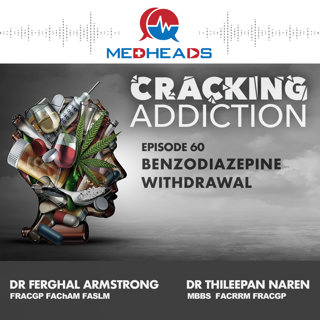
Benzodiazepine withdrawal
In this episode of Cracking Addiction we discuss the timeframe and symptoms of benzodiazepine withdrawal, how to stabilise a patient on benzodiazepines and weaning and tapering of benzodiazepines within a community setting. We also discuss and highlight the importance of psychosocial support and lifestyle interventions in managing benzodiazepine dependence and withdrawal.Discussions and comments in our videos are for informational purposes only and should not replace the advice of your medical professional. Please consult with your doctor before making any changes to your medical treatment or lifestyle.Latest Blogshttps://www.meducate.com.au/blogAbout Meducate ®Meducate provides online education for doctors, clinicians, health professionals and the public.See the website to browse the many different talks and courses available https://www.meducate.com.au
5 Okt 202218min
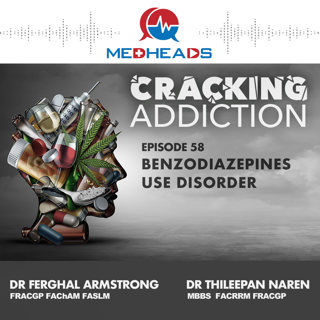
Benzodiazepine use disorder
In this episode of Cracking Addiction we discuss the effects of chronic benzodiazepine usage and the mechanisms of which tolerance and dependence to benzodiazepines develops and discuss the time course in which these syndromes can occur as well as discuss the diagnostic criteria for a benzodiazepine use disorder.Discussions and comments in our videos are for informational purposes only and should not replace the advice of your medical professional. Please consult with your doctor before making any changes to your medical treatment or lifestyle.Latest Blogshttps://www.meducate.com.au/blogAbout Meducate ®Meducate provides online education for doctors, clinicians, health professionals and the public.See the website to browse the many different talks and courses available https://www.meducate.com.au
28 Sep 202220min
